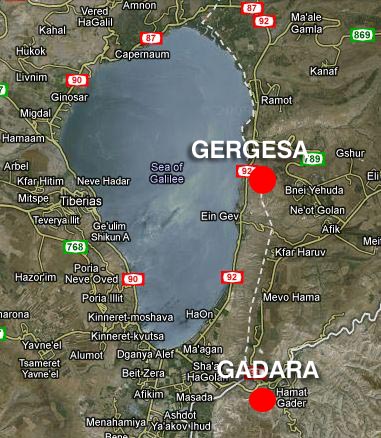The problem with geography is, that geography changes. That is, the names of places change. So, this could cause some confusion. In fact, this has caused some textual confusion in the mss which shows in the English translations.
Matthew 8:28
KJV "And when he was come to the other side into the country of the Gergesenes, there met him two possessed with devils..."(Mt 8:28).
NIV "When he arrived at the other side in the region of the Gadarenes, two demon-possessed men..." (cf. ESV, NASB)
Then, there seems to be an inconsistency that we see in the synoptics. The KJV flips Gergesenes with Gadarenes.
Luke 8:26
KJV "And they arrived at the country of the Gadarenes, which is over against Galilee."
NIV "They sailed to the region of the Gerasenes, which is across the lake from Galilee." (cf. ESV, NASB)
The KJVO certainly cannot have this! Why would Luke 8 agree with modern versions in Matthew 8?
First, we need to get one issue off the table. These are the same events. The differences in names is not enough to simply say, that there were two swine demonizations.
Similar city names exist in different locales. See map below.
City names go through changes in pronunciations and spellings through the years. We know from modern geography (excavations on the East shore of Galilee) that the modern city of Kursi is the most likely location. Even this city has been called different things: Kursi, Koursi and Kersa.
The red dot with Gergesa is where modern Kursi is.
One commentator (Lane) says: "... a town whose name is preserved in the modern Kersa or Koursi. At the site of Kersa, the shore is level, and there are no tombs. But about a mile further south there is a fairly steep slope within forty yards from the shore, and about two miles from there cavern tombs are found which appear to have been used for dwellings."
In fact, scholars are pretty well convinced that modern Kursi is the location. ISBE states "Origen’s comment that there was a village called Gergesa on the eastern shore of the Sea of Galilee was confirmed in the course of road-building operations in 1970. D. Urman has excavated a first-century a.d. fishing village, called Kursi in Jewish sources, and a fifth-century a.d. church that commemorated the site of the miracle." 1:281

Matthew 8:28
KJV "And when he was come to the other side into the country of the Gergesenes, there met him two possessed with devils..."(Mt 8:28).
NIV "When he arrived at the other side in the region of the Gadarenes, two demon-possessed men..." (cf. ESV, NASB)
Then, there seems to be an inconsistency that we see in the synoptics. The KJV flips Gergesenes with Gadarenes.
Luke 8:26
KJV "And they arrived at the country of the Gadarenes, which is over against Galilee."
NIV "They sailed to the region of the Gerasenes, which is across the lake from Galilee." (cf. ESV, NASB)
The KJVO certainly cannot have this! Why would Luke 8 agree with modern versions in Matthew 8?
First, we need to get one issue off the table. These are the same events. The differences in names is not enough to simply say, that there were two swine demonizations.
Similar city names exist in different locales. See map below.
City names go through changes in pronunciations and spellings through the years. We know from modern geography (excavations on the East shore of Galilee) that the modern city of Kursi is the most likely location. Even this city has been called different things: Kursi, Koursi and Kersa.
The red dot with Gergesa is where modern Kursi is.
One commentator (Lane) says: "... a town whose name is preserved in the modern Kersa or Koursi. At the site of Kersa, the shore is level, and there are no tombs. But about a mile further south there is a fairly steep slope within forty yards from the shore, and about two miles from there cavern tombs are found which appear to have been used for dwellings."
In fact, scholars are pretty well convinced that modern Kursi is the location. ISBE states "Origen’s comment that there was a village called Gergesa on the eastern shore of the Sea of Galilee was confirmed in the course of road-building operations in 1970. D. Urman has excavated a first-century a.d. fishing village, called Kursi in Jewish sources, and a fifth-century a.d. church that commemorated the site of the miracle." 1:281

